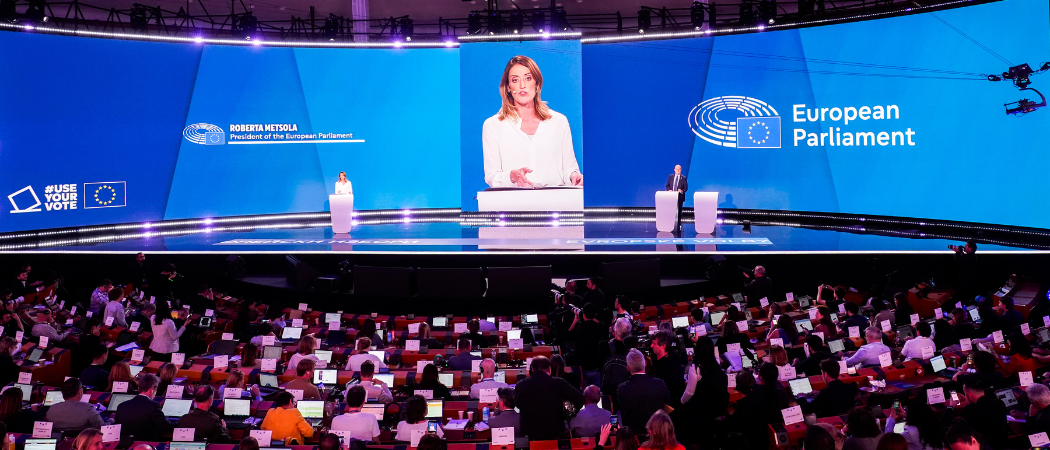With the biggest groups in Parliament set to remain the same, research and innovation priorities won’t drastically shift, experts say

Roberta Metsola, current president of the European Parliament, was re-elected as an MEP with a reported 87,000 first preference votes. Photo: Philippe Buissin / European Union
The results of the EU elections will not cause an “earthquake” for research and innovation policies, as the largest political group, the European People's Party (EPP), is on course to maintain its dominance.
With votes still being counted, the centre-right EPP, left-wing Socialists and Democrats and centrists Renew Europe are set to remain the Parliament’s biggest groups. Current European Commission president Ursula von der Leyen has said she will try for another grand coalition with these three groups, meaning that despite gains by far-right parties around Europe, the centre of gravity in the Parliament will remain largely unchanged.
“The results by themselves are not an earthquake in terms of R&I policies; we have seen very broad consensus about these in the past, and this will probably not change,” said Thomas Jørgensen, director for policy coordination and foresight at the European University Association.
The EPP, Jørgensen said, has in the past dominated the R&I agenda in the EU, particularly through vocal individuals such as German MEP Christian Ehler, who is set to be re-elected. Jørgensen hopes that other parties in the new Parliament will put R&I higher up their priority list as it becomes increasingly important for Europe's competitiveness and autonomy.
“There is definitely room for more R&I champions in the hemicycle. More parliamentarians advocating for investment in R&I, across the political groups, would be a game-changer,” he said.
Robert-Jan Smits, president of the executive board of the Eindhoven University of Technology and former director general of research and innovation at the European Commission, also believes that the new Parliament will continue on the same track for R&I.
“Traditionally in the Parliament, the EPP, S&D and Renew Europe have been the biggest supporters of the EU research policy and programmes. I am convinced that their support will continue after the elections,” he said.
Kurt Deketelaere, president of the League of European Research Universities (LERU), is optimistic about the direction of R&I policies following the results. LERU is calling for increased investment in R&I, better protection for academic freedom, better coordination of R&I funding across different EU- and national-level programmes, improving the attractiveness of research careers, among other points.
“Realisation of this within an EPP/S&D/Renew context is of course most opportune since all three have a positive attitude vis-à-vis R&I and education,” Deketelaere said.
“We hope for the continued leadership of Christian Ehler on R&I in the Parliament, he is our best guarantee for safeguarding the EU R&I agenda.”
Industry and competitiveness to the fore
A key point on the manifestos of many of the parties and groups is strengthening EU competitiveness, industry and strategic autonomy, for example access to critical raw materials and energy supplies.
This has come from growing concern among Europe’s leaders that over the past decade the continent has been falling further behind the US and China on areas such as research and innovation investment, productivity growth, as well as having lower levels of private investment.
The competitiveness alarm bells have been ringing in Europe, especially since the publication of a report earlier this year by former Italian prime minister Enrico Letta that called for the EU’s single market to be reformed to support industry and competitiveness.
Another former Italian prime minister, Mario Draghi, is working on a paper on boosting competitiveness, which he says will include calls for “radical change”. The fragmentation of Europe’s single market is highlighted as being a particular hindrance for industry.
The competitiveness agenda stemming from these concerns, and that appears in many manifestos, could receive a boost at the expense of the green agenda, due to the strong performance of right-wing groups such as the European Conservatives and Reformists Group (ECR) and the Identity and Democracy Group (ID), with parties that have a strong pro-climate stance such as the European Greens, projected to fall from 71 MEPs to 52.
It could mean that the green transition, which has been at the centre of EU policy over the past five years, is usurped by a drive to strengthen competitiveness.
Asked what his message to the new Parliament would be, Smits stressed competitiveness, but said that the EU must also focus on realising its climate ambitions.
“This requires big investment, both at national and European level, in talent and knowledge,” he said.
Smits supports calls for a new overarching umbrella funding programme to bring Horizon Europe, Digital Europe and the European Defence Fund under the authority of a new vice president for competitiveness and resilience at the Commission.
Party promises on R&I
A study of 22 political parties’ policies on R&I shows that many believe that at least 3% of the EU’s total GDP should be invested in research and innovation.
The survey, led by Initiative for Science in Europe, also found that there was wide support for increasing the EU budget and simplifying bureaucracy for research funding.
The EPP has one of the most elaborated plans for R&I in its election manifesto. It goes further than many parties and calls for the EU’s R&I budget to be raised to 4% of GDP. Currently it is around 2.22%. This can only be achieved if individual member states increase their R&I spending, with only four countries currently spending over 3%.
The EPP also wants the European Defence Agency to fund artificial intelligence research for both civilian and military purposes, and to create a funding programme to increase the number of women-led technology start-ups.
The ECR focuses on the industry side of R&I policies, saying it will support investment in “top-tier transport infrastructure” and focus on “swiftly turning inventions into tangible European products and companies”. “With us, there are no sunk costs – only a flourishing and innovative European budget that is guaranteed to deliver,” the group’s manifesto says.
The European Democratic Party, whose MEPs usually sit in the broader Renew Europe group, wants to create a European Institute of Health to coordinate medical research and to increase investment in the space sector. Like the ECR, the party wants better commercialisation of research results and to give SMEs easier access to funding.
Another factor in the EU election has been the huge surge in support for France’s Rassemblement National (RN) at the expense of current president Emmanual Macron’s Renaissance party. Macron has been one of the most vocal supporters for greater R&I investment among EU leaders, saying in a speech in April that “Horizon Europe must be reinforced by focusing on the most effective programmes such as the European Research Council”.
Following the disappointing showing in the EU vote, Macron announced a snap election for the end of this month that could change the make-up of the French parliament.
Right-wing gains
Parties typically described as far-right made big gains in France, Germany and Austria.
In Germany, the Alternative for Germany (AfD) party came second, with 16% of the vote. This is a five percentage point increase on 2019, and higher than any of the current governing parties in Berlin.
In its manifesto, the party derides Horizon Europe’s “ideologically driven” focus on areas like climate, creativity, and inclusive society. It wants there to be no successor framework programme to Horizon Europe and calls for the scrapping of the European Research Council.
Instead, the party wants research policy to be left largely to member states and is in favour of “unrestricted freedom of research and technological openness” rather than what it sees as “socio-political” goals set by state institutions.
Smits is concerned about the influence that far-right parties could have on R&I. “The far right and the Europe critical parties […] are not the biggest fans of science and certainly not of universities and academic freedom,” he said. “They will therefore neither support the plea for a sharp increase of the EU research budget, nor for a reinforcement of the European Research Area.”
Deketelaere, meanwhile, wonders what the far-right gains will mean for, the European Commission and Council of the EU. “The strong presence of extreme-right in a number of EU member states can mean that commissioners are put forward from extreme right parties, just like prime ministers from those parties can surface in the European Council. If that is the case, we must of course be aware that the EU's R&I agenda can shift in the Commission and in the Council,” Deketelaere said.
“With the Commission as the one who proposes legislation and the Council as a co-decider on EU legislation, we cannot be at ease, even with this election result which is better than we hoped for over the past months.”
Jørgensen sees the far-right gains as less of an issue for the EU’s R&I landscape. “The European far-right is divided on many concrete issues, and many of the parties are not directly anti-R&I,” he said. “There might be greater resistance towards common EU spending, but the results will likely not derail R&I policies as we know them.”





 A unique international forum for public research organisations and companies to connect their external engagement with strategic interests around their R&D system.
A unique international forum for public research organisations and companies to connect their external engagement with strategic interests around their R&D system.